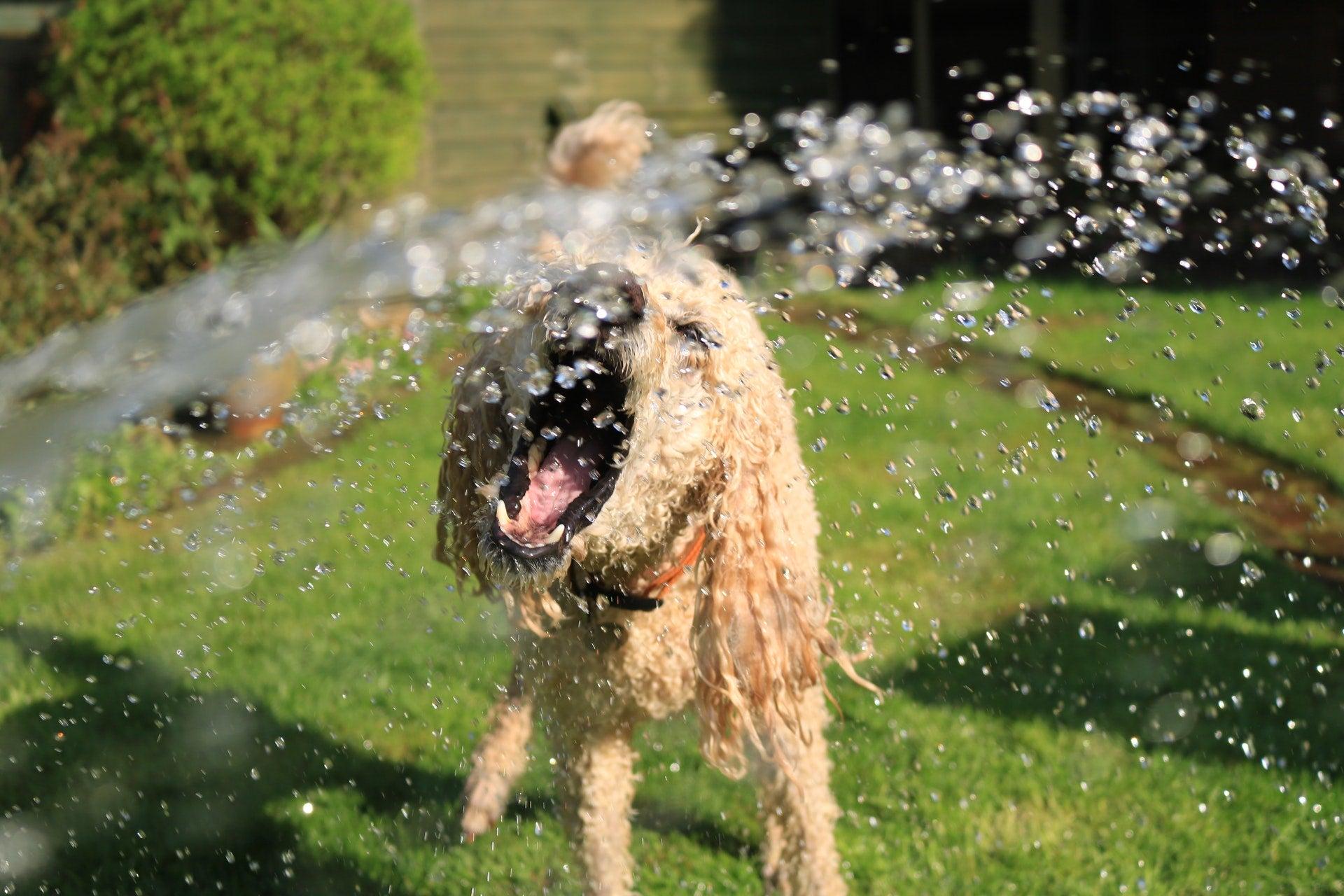Can dogs get heatstroke? The answer is yes, and in this blog, we explore the signs of heatstroke in dogs, how to prevent your pup from overheating and what to do if you suspect your dog has heatstroke.
- Home/
- Dog/
- Health & Wellness/
- Save Your Dog From Heatstroke With These 9 Handy Tips!
Save Your Dog From Heatstroke With These 9 Handy Tips!

If you’re wondering “can dogs get heatstroke?“, just imagine wearing a thick, winter coat, in the summer’s heat. Well, for our beloved pups, that’s a reality throughout the hotter months.
But unlike us, dogs don’t sweat through their skin (which is our body’s way of cooling us down). Instead, dogs release heat through their noses and paw pads, or by panting – it’s the natural way their bodies regulate temperature.
Dogs are susceptible to heatstroke for this very reason, and that means we have to take extra care when the temperature is a bit high. Heatstroke can be extremely dangerous for dogs and can even be fatal in some cases. So, you need to know how to prevent it, first and foremost!
Signs Of Heatstroke In Dogs
Once a dog starts to experience heatstroke, you need to make sure you act fast, because heatstroke can be life-threatening. Watch out for these symptoms when it’s hot:
- Collapsing or dizziness
- Physical weakness
- Dribbling or salivating
- Excessive panting
- Increased heart rate
- Agitation
- Very pale or red gums
- Vomiting
- Little to no urination
- Struggling to breathe
What To Do If You Suspect Heatstroke
Taking quick action is essential to saving your dog from organ damage, brain damage, or even death. If you notice any of the symptoms outlined above, make sure you do these things:
- Immediately remove your dog from the heat, out of the sun, and preferably somewhere that has a draft
- Use cool, not freezing, water, to wet their coat, and possibly the floor or area surrounding them
- If you’re inside, open windows, and turn on a fan if you have one
- Call your veterinarian, or take your dog as soon as possible to them. Even if you just suspect heatstroke, the vet can do an examination and monitor your pup
How To Prevent Heatstroke In Dogs
There are things you can do to help your furry friend to stay cooler during the hotter months, that will also save you the worry of them experiencing heatstroke.
Watch The Clock
There are hours in the day when the sun is stronger and hotter, so choose the cooler hours to take your dog for a walk or to play outside. The stronger sun tends to hit between the hours of 12 pm and 4 pm, but depending on the climate you live in, this could be longer or shorter.
Stay Hydrated

When you’re hot, the thing you need the most is a nice glass of cold water. Your pup feels just the same, so make sure you keep their water bowl full, with clean water. If you’re out and about, carry a bottle of water and a small container you can use as a bowl.
Keep Fur Clean & Trimmed
Dogs with thicker hair are likely to feel hotter than dogs with shorter fur. But, their fur tends to shred more naturally, which keeps them cool. If you are concerned about your dog’s hair length, give them a trim, especially around the eyes and feet.
The best way to keep them cool is by frequently washing them and brushing their hair. Clean, brushed fur allows air to circulate more, which is bound to keep them feeling cooler all day. Plus, who doesn’t love a shower when it’s hot outside?
Leave Windows Open, Avoid Conservatories
It’s sometimes necessary to spend days inside, especially during those hotter hours of the day. When you have to keep your pooch indoors, make sure there is fresh air ventilating the room by keeping windows open.
Rooms that have glass ceilings, such as conservatories and greenhouses should be avoided – the glass magnifies the heat, making it dangerous to sit in for a long period of time when the sun is shining through. Shade and cool air are key to preventing heatstroke for your pup.
Water Sprinkler In The Yard (Or A Pool)

When you do want to let your dog outside in the garden, make it fun and playful, as well as safe! If you have grass and plants, get a water sprinkler that your furry friend can play with while also keeping them cool. Or, get a little paddling pool for them to jump in and out of!
However, when you let your dog swim, be careful of water intoxication. This is when dogs drink too much water at once. Water intoxication can lead to brain damage, and in the worst cases can be fatal. Symptoms of water intoxication include:
- Vomiting
- Falling over or collapsing
- Dizziness
- Lethargy
- Pale gums
Pale Dogs Should Stay Out Of The Sun
Like us, dogs are vulnerable to the rays of the sun. And paler dog breeds (and those with very short fur) are more likely to suffer from sunburn. All dogs should stay out of the sun during the hottest hours of the day, but for pale dogs, it’s essential. The skin in the more vulnerable parts can become burnt and irritated, which can be extremely painful. The vulnerable parts are the nose, ears, and feet.
You can use animal sunscreen or a waterproof human one that’s free from toxic ingredients. It will protect them from burning but isn’t as safe as simply keeping them out of the sun. Sunburn can worsen existing skin conditions your dog might have, and increase the chances of skin cancer.
Check The Tarmac And The Sidewalk
This is something some pet parents might not even notice, but the tarmac on the ground you walk on can be extremely hot from the sun! We don’t notice because we wear shoes, but for dogs, their paws are sensitive to that heat.
So, before you head out on a walk, check the pavement with your hand. If it’s too hot to touch with your hand, it’s too hot for your pup’s paws!
Never Leave Them In A Car

Going for a road trip in the sunny weather is dreamy, but you have to be cautious of how long you leave your dog in the car. Keep windows ajar while you’re on the go, but when you stop anywhere, don’t leave your dog in the car with closed windows. It’s best to leave them at home if you’re venturing out for anything more than gas in the heat. Dogs can easily overheat in cars, which can cause heatstroke or instant death in some cases.
Try Ice Cubes As Snacks
If you want to cool your dog down, you can give them an ice cube as a snack, or freeze yogurt in an ice cube tray and give these to your pup. They’ll lick at it for a while, so it’s entertaining and hydrating. Or, you can put their chew toy in the fridge or freezer to make it cold. It will be a treat on those, particularly warm days!
Heatstroke in Dogs
Every dog is susceptible to heatstroke, so you need to ensure that their environment is safe and cool, especially when the weather is really hot. Higher temperatures increase the risk of heatstroke and dehydration, and exposure to the sun can add to the chances of developing skin complications. So even if there’s a breeze, staying out of the sun is important for saving them from sun damage and heatstroke!
Sources
 C
C



